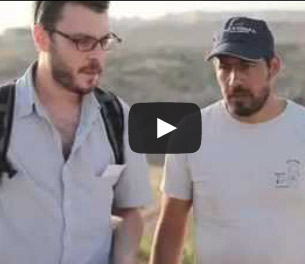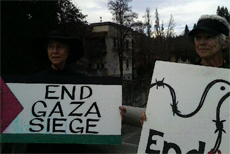|
|
|
< Report Four: Memories of Mississippi and The Playbook of Liberation >
July 27, 2011
Bil'in, Jerusalem and environs
CLICK HERE TO READ THE AFRICAN HERITAGE DELEGATION'S
STATEMENT AND FINDINGS
This delegation traveled concurrently with the
Today's Youth, Tomorrow's Leaders Delegation> > >
CLICK HERE FOR MORE ON THE YOUTH DELEGATION
We encourage members of the delegation to comment and respond to the experiences they have received during our Israeli / Palestinian delegations in their written Travel reports. Individual delegates shall contribute to these reports.

Reports and Photos from the African Heritage Delegation (July 2011):
Delegation 38 Announcement
Report 1: "What is the Purpose of Your Trip?"
Report 2: "I Will Never Be the Same"
Report 3: Holy Sites in the Shadow of Settlements
Report 4: Memories of Mississippi and The Playbook of Liberation
Report 5: The Prospect of a Great Gift: Final Reflections from IFPB’s Summer Delegations
Summer 2011 Delegates in Action
Statement of the African Heritage Delegation
CLICK HERE TO READ ABOUT THE AFRICAN HERITAGE DELEGATION AND TO SUPPORT THIS EFFORT
Reports are not exhaustive reports of every encounter or experience, but impressions of those things that most affect people. Travel reports do not necessarily reflect туры выходного дня из иваново цена of interreligious peacekeepers, travel managers or delegation partner organisations. We hope that you will enjoy reading and encourage you to share these reports with others.
African Palestinians: The Playbook of Liberation
At the end of last week, our African-American delegation met with representatives of the Palestinian African community, who have a small neighborhood in the old city of Jerusalem.
Our host, Mahmoud Jeddah, told us a brief history of the community (see the delegation's slide show to see photos from our visit). African Muslims making the pilgrimage to Mecca from Senegal and North Africa often traveled to Palestine to visit the Al-Aqsa Mosque. Over time, some of these Africans stayed and founded a community here.
These African brothers and sisters welcomed us into their community and told us about their double burden of fighting the Israeli occupation and racism. They diligently distinguished between the prejudice they might sometimes feel from their Palestinian Arab brothers and sisters and the institutional racism perpetrated against them by the State of Israel.
Members of this African Palestinian community live very close to the Al-Aqsa Mosque and have become its main custodians. So when Arial Sharon and his Israeli security forces entered the mosque in 2000, these African Palestinians played an important role in the second intifada (click here to watch Brother Mahmoud Ali's video).
Mahmoud spent more than a decade in an Israeli prison for participating in the Palestinian resistance. He told us a touching story about a successful hunger strike that the prisoners organized to get a basketball and relax. My thoughts immediately shifted to the United States, where the prisoners of Pelican Bay State inspired the prisoners of California to go on hunger strike in defense of their rights.
As Mark, a member of the African Heritage delegation, often said during our trip: "oppression uses the same way of thinking around the world as liberation."
- Jesse Hagopian
a version of this report appears here on Jesse Hagopian's blog
Checkpoints
I have finally experienced what it feels like to be stopped at a checkpoint and be harassed by Israeli soldiers.
Two young Israeli soldiers who appeared to be teenagers boarded our bus with automatic weapons. As one soldier checked my passport, the barrel of his automatic weapon rested on the side of my thigh with his finger pressed toward the trigger. This was a potentially traumatizing experience. The soldiers’ presence gave me a sense of intimidation versus a sense of security.
These are the kinds of situations the Palestinian people experience on a daily basis.
- Michael W. Nettles
The Black Panther Party of Israel
After all I have learned from my teacher and friend Aaron Dixon, the founder of the Seattle chapter of the Black Panther Party, I was especially intrigued and exited to learn about the Black Panther Party of Israel (I will refer to it as BPP-I).
We were met by a young European Israeli who introduced us to the history of the BPP-I and showed us a short film about the founding of the party. Later we got a walking tour from Reuven Abergil, an original founder of the Israeli Black Panthers (view the delegation slideshow for photos).
The BPP-I was formed in the early 1970s by Mizrahi Jews — Jews of North African and Middle Eastern decent who faced severe racism in Israeli society. According to Abergil, Mizrahi Jews were publicly spoken of by Israeli politicians as animals, denied access to proper education and housing, barred from jobs, etc.
The founders originally thought about naming their organization the Roaring Lions, but they decided it would put more fear in the Israeli government to associate themselves with the militancy of the Black Panthers — and it worked. The Israeli government freaked out, and many Mizrahi Jews began joining the BPP-I.
Critically, the Black Panther Party of Israel did not limit their political activity to defending Mizrahi Jews, but also joined in solidarity with Palestinians struggling for their rights in an important showing of solidarity across religions in the struggle for social justice.
- Jesse Hagopian
a version of this report appears here on Jesse Hagopian's blog
The Beauty of Bil’in
At the end of last week, our African-American delegation met with representatives of the Palestinian African community, which has a small neighborhood in the old city of Jerusalem.
Our host, Mahmoud Jeddah, told us a short history of the community (see the delegation's slide show to see photos from our visit). African Muslims making the pilgrimage to Mecca from Senegal and North Africa often travelled to Palestine to visit the Al-Aqsa mosque. Over time, some of these Africans stayed and founded a community here.
These African brothers and sisters welcomed us into their community and told us about their dual burden of fighting Israeli occupation and racism. They were keen to distinguish the prejudice they may sometimes feel against their Palestinian Arab brothers and sisters from the institutional racism perpetrated against them by the state of Israel.
Members of this African Palestinian community live very close to the Al-Aqsa mosque and have become its main custodians. So when Arial Sharon and his Israeli security forces entered the mosque in 2000, these African Palestinians played an important role in the second intifada (click here to watch brother Mahmoud Ali's video).
Mahmoud spent more than a decade in an Israeli prison for his involvement in the Palestinian resistance. He told us the touching story of the successful hunger strike that the prisoners organized to play basketball and relax. My thoughts immediately moved to the United States, where the prisoners of Pelican Bay State inspired the prisoners of California to go on hunger strike in defense of their rights.
As Mark, a member of the African heritage delegation, often said during our trip: "oppression uses the same way of thinking around the world as liberation."
- Sterling Pack
Memories of Mississippi
The recognition of the extent of discrimination and oppression in Israel/Palestine (for example, walls, murder scenes, unequal funding of education, class/race separation, employment practices, gender inequality, etc.)) brought back serious memories of my childhood and teaching in Mississippi, where the "white" was right. When it comes to Israel/Palestine, Jews are "right." Despite the biblical references to Jews as the chosen people, I know that this is not how God acts, and I still cannot understand how Jews believe they have the right to oppress others who are trying to stay on the land they should be able to rightfully claim.
I see the walls oppressing the Palestinians, and I am reminded of the "only white" signs of my youth - the knowledge that there are places where I cannot go. One particular example is the basis of why I never learned to swim. White kids in my Mississippi community had access to a beautiful swimming pool that African-American kids could only visit in passing. To learn to swim, it would be necessary to overcome muddy waters together with water moccasins, black runners, rattlesnakes and "name the snake"."As much as I wanted to learn to swim, I didn't want to be the main dish that different reptiles like for dinner.
Another example of a wall in Mississippi was when I was among 22 African-American teachers selected to teach in an all-white school during court-ordered desegregation. The experience was terrifying; it took two weeks of nonviolent attempts to enter the school before we were able to enter the doors of the all-white DeKalb School. Day after day we arrived, and the KKK brought us back in full dress, on horseback, on horseback... with lead shotguns. With your help ... civil rights lawyers, I could apply almost daily to report bad actions at this school (i.e. white bells only for class breaks, white bells only for lunch, meetings of white teachers, no meetings of teachers for African Americans and m.in . teaching only African-American children). I loved African-American children because many of them were my cousins or neighbors. The pain in my soul was related to the fact that illegal temporary solutions appeared in the name of school integration in accordance with the recent court order on desegregation within 48 hours.
I heard several Palestinians talking about bloodshed and profiling. These actions reminded me of the civil rights activists who were killed in Mississippi, a few miles from my home. I remembered a young man who went to the "bottom" (night club) on Saturday evening. He had an argument with a police officer in Philadelphia, Mississippi, and was killed. No one has been charged with his murder. I also think of my uncles returning home from Cleveland, New York and other places. They knew that at some point they would get a fine for bad "painting" (black leather / driving a decent car).
Finally, despite all the pain and suffering of the Palestinian people, he is extremely friendly and charming. I am greeted with open arms at every Palestinian door. I want the Palestinians to know that our struggle is similar. Today, the attitude towards African Americans in Mississippi is much better. Many African Americans are lawyers, engineers, politicians, respected educators and prominent citizens.
I call on the Palestinians to continue the struggle without violence, because I believe that a brighter day awaits us.
- Gloria Brown, PhD
The Greening of Israel
The Greening of Israel is a systematic approach to eliminating the history, culture, and people of the Palestinian territories. For example, subsequent to the destruction of local Palestinian villages, the Jewish National Fund developed Canada Park. The park serves as a recreational and ecological center for use by Israeli citizens.
The Jewish National Fund sought the support of the black community, environmental activists, and the gay and lesbian community to fund the resources necessary to maintain the park. After learning this information, I was hurt, sad, and frustrated. I was upset with the idea the cultural contributions of a people were quickly erased by the bulldozers of the Israeli government. This knowledge has further influenced by desire to speak out against Palestinian oppression.
I will end my trip report with a prayer….
Dear God,
Thank you for this land. Thank you for the people. May this holy people know peace, mercy, and justice.
- Carolyn Boyd
Media interested in interviewing the participants when they return, and groups wanting information about speaking engagements, should contact Interfaith Peace-Builders at or 415.240.4607.
CLICK HERE FOR REPORTS & PHOTOS FROM THE YOUTH DELEGATION
This delegation is traveling concurrently with the "Today's Youth, Tomorrow's Leaders" Delegation > > >
SUPPORT INTERFAITH PEACE-BUILDERS!
Nothing better prepares activists to work on the conflict than eyewitness experience. Your donation will further the education and engagement of new participants and build a larger, more diverse movement! Click here to donate online!
TRAVEL TO ISRAEL/PALESTINE WITH INTERFAITH PEACE-BUILDERS!
Your participation as an eyewitness will enrich your understanding of the conflict and empower your work back in the United States! Click here for information on upcoming delegations.
| Select a report to view: | Announcement | 1 | 2 | 3 | 4 | 5 | ACTION | STATEMENT |


 MUST WATCH: VIDEO CLIPS FROM IFPB's MAY-JUNE 2013 TRIP
MUST WATCH: VIDEO CLIPS FROM IFPB's MAY-JUNE 2013 TRIP 
 BUY FAIR TRADE OLIVE OIL & MORE - DIRECT FROM PALESTINE!
BUY FAIR TRADE OLIVE OIL & MORE - DIRECT FROM PALESTINE! 